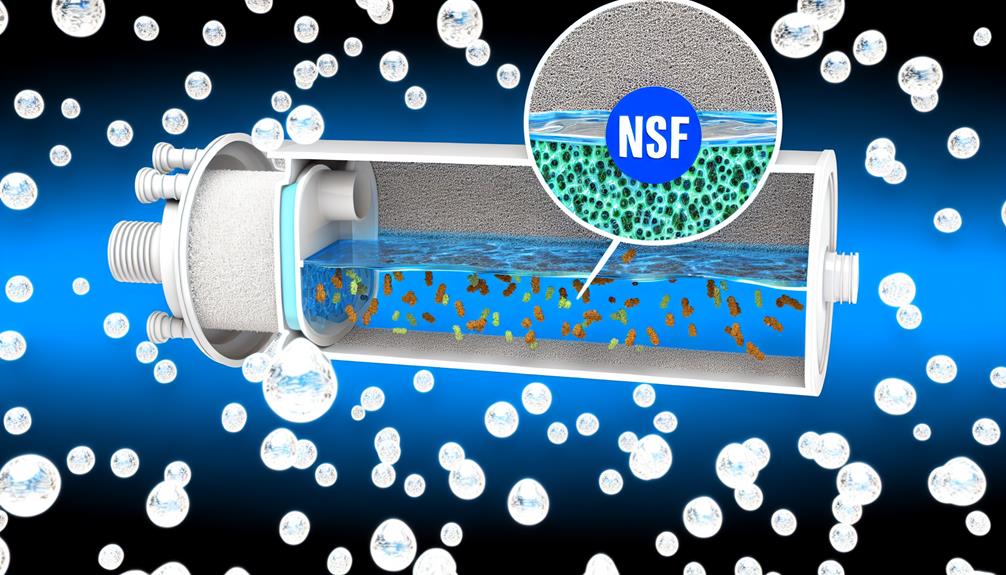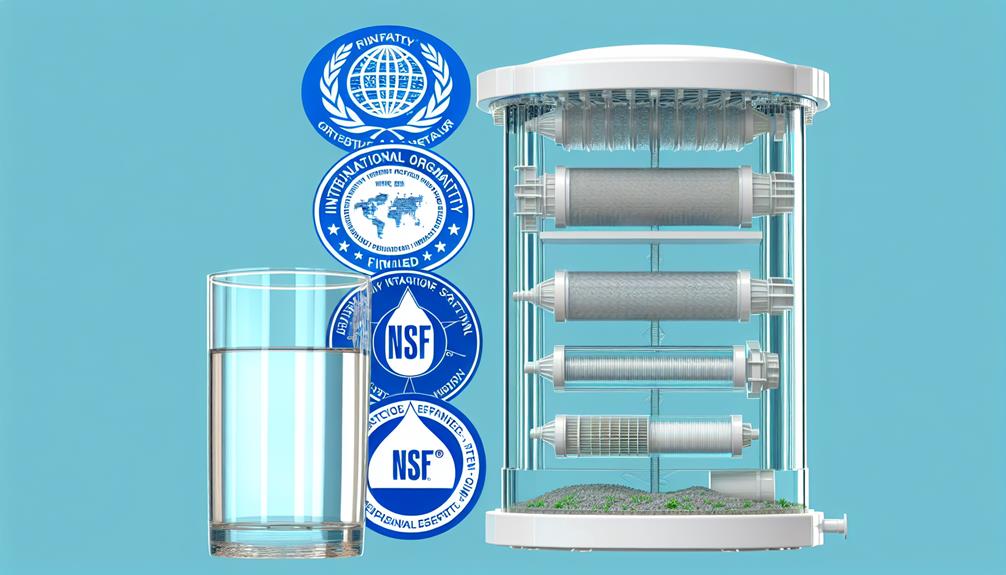Just as the ancient Roman aqueducts were a testament to the ingenuity in water engineering, modern innovations demand standards like those set by the International Organization for Standardization (ISO) to ensure the safety and quality of drinking water.
You rely on these standards to have confidence in the water you consume daily, but have you ever considered what's behind the ISO certification on your water filter? These standards aren't just badges of honor; they represent a rigorous process of quality assurance and effectiveness in removing contaminants.
As you pour yourself a glass of water, bear in mind that the journey to compliance is intricate, laden with procedures that filter manufacturers must navigate with precision.
Now, consider the implications of what might happen if these standards were compromised and the importance of vigilance in the industry.
Understanding ISO Standards
ISO standards provide a robust framework that you can rely on to ensure your drinking water filters meet stringent quality, safety, and efficiency benchmarks. When you're navigating the intricate landscape of Drinking Water Treatment Units, the application of these standards is crucial for compliance and consumer trust.
ISO's systematic approach to standardization encompasses a plethora of aspects, from material safety to the validation of performance claims.
Achieving certification under ISO standards isn't a one-off event. It demands a rigorous commitment to continuous improvement and consistent quality management. This is where NSF, recognized for their expertise in public health and safety, steps in. They offer testing and certification services that are aligned with the requirements of ISO, ensuring that your filters effectively remove contaminants from drinking water.
Certification by NSF to NSF Standards, which are harmonized with ISO, provides external validation that your products have been tested and meet defined standards for safety and performance. This isn't simply about adhering to regulatory norms; it's about exemplifying excellence in a market that prioritizes health and well-being.
ISO Certification Process
Understanding the foundational role of ISO standards in ensuring water filter quality, let's now examine the methodical process a company undergoes to achieve ISO 9001:2008 certification.
As you venture into selecting a water filter, you're likely to encounter NSF International—renowned for its NSF Drinking Water Treatment certifications. This intertwines with the ISO certification process, highlighting a commitment to standards compliance and quality.
Here's what the certification journey typically involves:
- Preparation
- Identifying and defining processes
- Documenting procedures and policies
- Implementation
- Executing the documented processes
- Training staff and integrating standards into daily operations
During this phase, a company must ensure that their product testing aligns with ISO guidelines. NSF certification is a testament to that alignment, particularly when NSF sets the standards for contaminant reduction claims.
- Evaluation
- Monitoring processes for effectiveness
- Making necessary improvements
- Certification
- Undergoing rigorous third-party audits
- Achieving validation of compliance
Once certified, products proudly bear the mark of certified products, signaling to you, the consumer, that what you're purchasing has met the highest standards of testing and certification. Remember, the certification process isn't a one-off event but an ongoing commitment to excellence and customer satisfaction.
Compliance Monitoring Techniques
To ensure that drinking water filters consistently meet ISO standards, manufacturers must engage in rigorous compliance monitoring techniques. Regular on-site inspections are crucial for maintaining adherence to these standards throughout the manufacturing processes. These inspections serve as a frontline defense in safeguarding public health and safety, affirming that the systems designed to reduce contaminants of health concern are effective and reliable.
Periodic audits of your quality management systems aren't mere formalities; they're essential to verify compliance with ISO requirements and the broader framework set by the Environmental Protection Agency and the Safe Drinking Water Act. Through statistical process control, you'll monitor product quality with precision, swiftly identifying any deviations from ISO specifications.
When non-conformities are detected, it's imperative that you implement corrective and preventive actions promptly. This responsiveness is key to upholding the integrity of the NSF DWTU certification of POU (point-of-use) devices.
Moreover, continuous monitoring of key performance indicators allows you to assess the effectiveness of your ISO compliance efforts analytically. By diligently tracking these indicators, you'll ensure that the testing conducted meets not only the compliance standards for drinking water but also the expectations of vigilant regulatory bodies and consumers alike.
Benefits of ISO Accreditation
When you choose a manufacturer with ISO accreditation, you're opting for a partner whose products and services meet rigorous international quality management standards. This assures that water filters and delivery systems are designed and manufactured with consistent quality, backed by a commitment to customer satisfaction and continuous improvement.
- Quality Assurance
- ISO standards provide the basis for the establishment of clear protocols.
- Third-party audits by entities such as the American National Standards Institute ensure compliance.
- Consumer Confidence
- Accredited water system components are certified to reduce specific contaminants.
- NSF was founded to establish minimum requirements for safety and performance.
ISO accreditation isn't just a badge. It's a promise that drinking water system manufacturers are dedicated to providing safe and reliable products. This technical endorsement signifies that a detailed, analytical approach has been applied to every facet of production, aligning with National and international expectations.
Trust in these manufacturers grows because their filtration systems aren't just built—it's proven that they function at a level deemed exceptional by a respected testing organization. By selecting ISO-accredited filters, you're investing in a verified commitment to quality and health.
Addressing Non-Conformance Issues
In the realm of ISO-accredited drinking water filters, promptly addressing non-conformance issues is crucial to maintaining the integrity and safety of the product. When you identify a specific non-conformance in your drinking water filter, it's imperative to dissect the issue in alignment with the stringent ISO standards that advocate for public health by regulating such devices.
You must delve into an analytical investigation to uncover the root cause of the non-conformance. This process isn't about quick fixes but ensuring a reduction in the recurrence of similar issues. You're tasked with crafting and executing corrective actions that are both effective and sustainable, meeting the requirements for the certification of drinking water systems sold in the market.
Continual monitoring is your next step to verify that these corrective measures are functioning as intended. It's not enough to assume; you need conclusive product test results to back up your corrective strategies. This commitment to testing and adjustment is pivotal.

